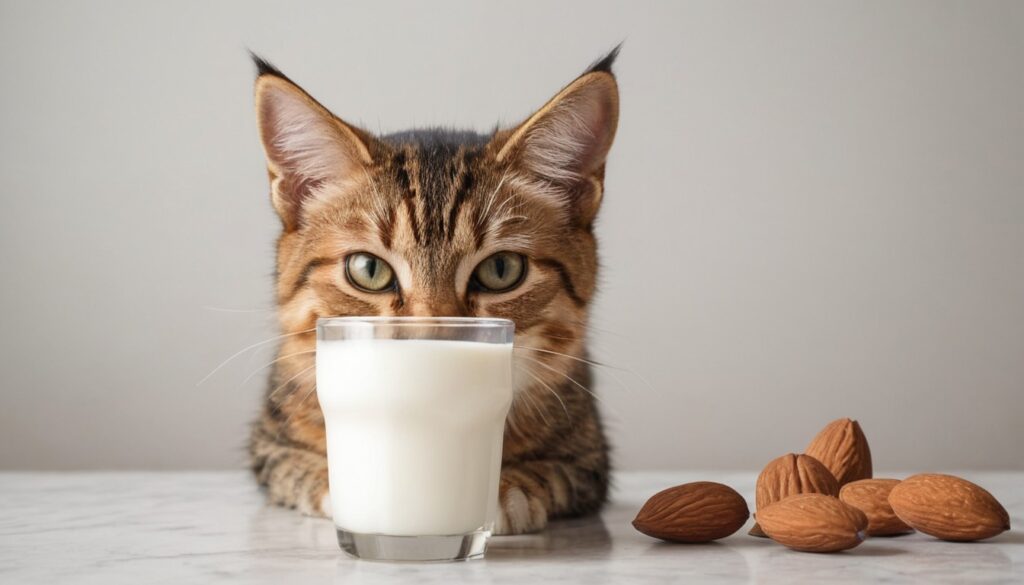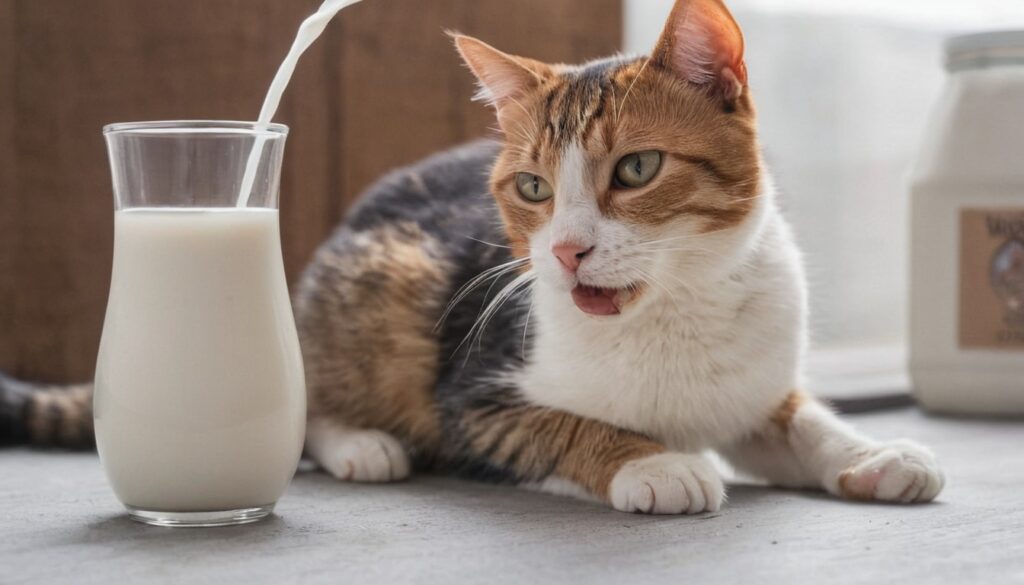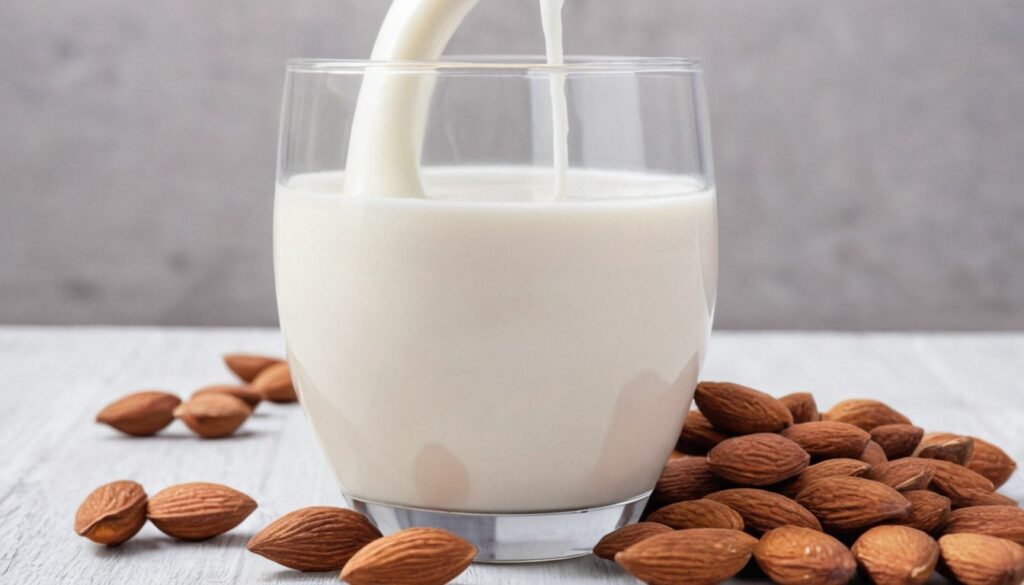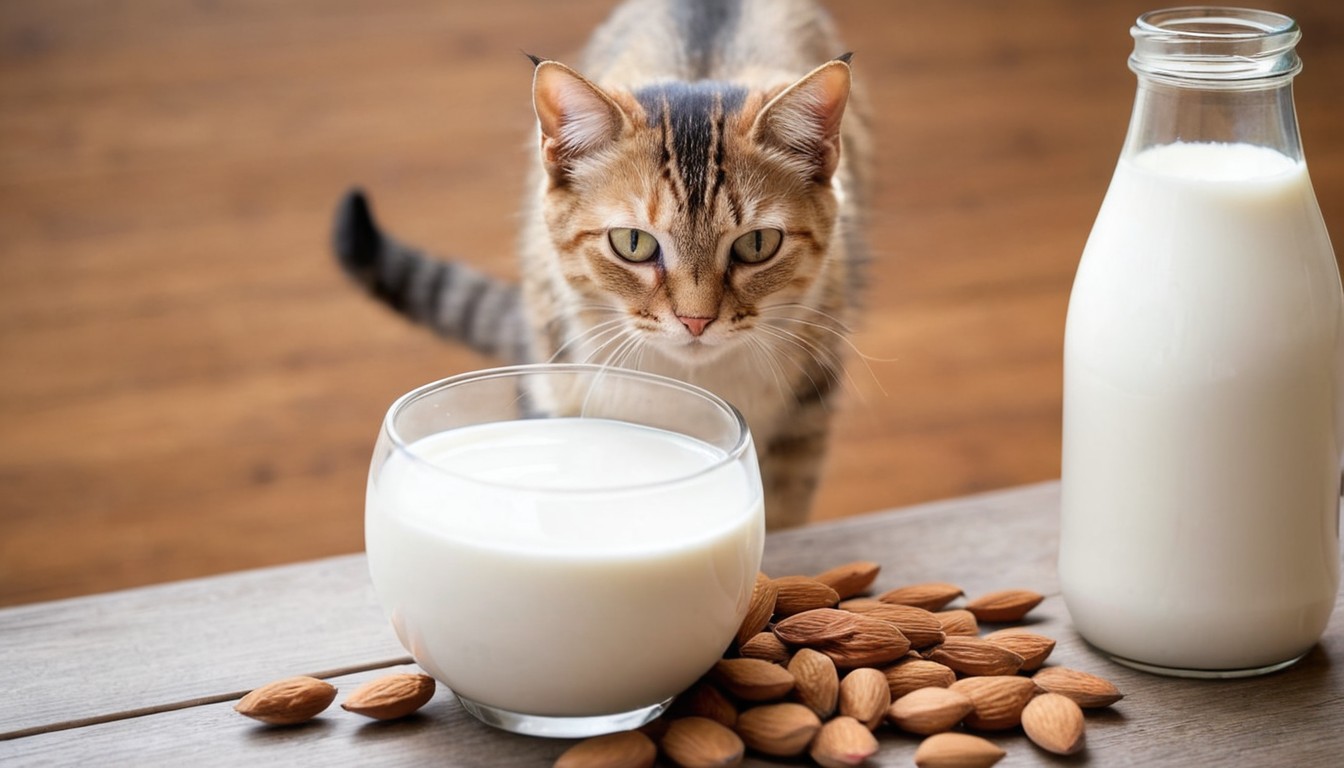Have you ever wondered if cats can drink almond milk? It’s a question that many cat owners have asked, especially those who are looking for alternative options to traditional cow’s milk.
While almond milk may seem like a healthy choice for humans, the same cannot be said for our feline friends. Cats have specific nutritional needs that differ from ours, and what may be suitable for us may not be safe or beneficial for them.
So, before you pour a bowl of almond milk for your furry companion, there are a few things you should know.
Nutritional Differences Between Cats and Humans

Cats and humans have distinct nutritional needs that differ significantly from one another.
While humans are omnivores and require a balanced diet consisting of carbohydrates, proteins, and fats, cats are obligate carnivores and need a diet rich in animal-based proteins and fats.
Unlike humans, cats can’t produce certain essential nutrients on their own and must obtain them from their diet. For example, cats require taurine, an amino acid found in meat, to maintain healthy vision, heart function, and reproductive health. On the other hand, humans can synthesize taurine from other amino acids present in plant-based foods.
Additionally, cats have a higher protein requirement compared to humans. Protein is essential for muscle development, tissue repair, and overall growth in cats. While humans can obtain protein from both animal and plant sources, cats rely solely on animal proteins for their nutritional needs.
Therefore, it’s crucial to provide cats with a diet that meets their unique nutritional requirements to ensure their overall health and wellbeing.
Potential Benefits of Almond Milk for Cats

Considering the unique nutritional needs of cats, it’s important to explore whether almond milk can provide any potential benefits for their health.
While cats are obligate carnivores and require a diet primarily consisting of animal protein, almond milk may offer some advantages. Almond milk is lactose-free, making it an alternative for cats with lactose intolerance. Additionally, almond milk is low in calories and fat, which can be beneficial for overweight or obese cats. It may also serve as a hydration option for cats who dislike drinking water.
However, it’s crucial to note that almond milk should only be given in moderation and as a supplement to a balanced and species-appropriate diet. Cats need essential nutrients such as taurine, which is found naturally in animal tissues but not in almond milk. Therefore, almond milk should never replace a cat’s primary source of nutrition.
Furthermore, it’s important to choose unsweetened almond milk without any additives or sweeteners that could be harmful to cats. Always consult with a veterinarian before introducing almond milk or any new food into your cat’s diet to ensure it’s safe and appropriate for their individual needs.
Potential Risks of Almond Milk for Cats

When giving almond milk to your feline companion, it’s crucial to be aware of the potential risks involved. While almond milk may seem like a healthy alternative to regular milk, it can pose several dangers to your cat’s health. Here are some potential risks to consider:
- Digestive issues: Cats have a difficult time digesting lactose, and almond milk often contains added sugars and thickeners that can further upset their digestive system. This can lead to diarrhea, vomiting, and stomach discomfort.
- Allergic reactions: Some cats may have allergies to almonds or other ingredients present in almond milk. Allergic reactions can manifest as itching, skin irritation, and even respiratory distress. It’s important to monitor your cat closely for any signs of an allergic reaction.
- Nutritional imbalances: Almond milk doesn’t provide the essential nutrients that cats need for optimal health. Cats require a diet rich in animal proteins and fats, and almond milk falls short in meeting these nutritional requirements. Regular consumption of almond milk can lead to nutrient deficiencies over time.
Before introducing almond milk to your cat’s diet, it’s crucial to consult with your veterinarian. They can provide guidance on whether it’s safe for your cat and recommend suitable alternatives if necessary. Remember, the health and well-being of your feline companion should always be the top priority.
Safe Alternatives to Almond Milk for Cats
To ensure the safety and well-being of your feline companion, there are several safe alternatives to almond milk that you can consider.
While almond milk may not be suitable for cats, there are other options that can provide them with the hydration they need. One of the best alternatives is plain water. Cats are designed to obtain most of their hydration from drinking water, so ensuring that they’ve access to clean and fresh water at all times is crucial.
Another option is to give them lactose-free cow’s milk. This can be found in pet stores and is specifically formulated for cats and dogs. However, it’s important to note that not all cats can tolerate cow’s milk, so it’s best to start with small amounts and monitor their reaction.
Additionally, you can try offering your cat bone broth, which is rich in nutrients and can be a tasty alternative to almond milk. Just make sure that the bone broth doesn’t contain any onions or garlic, as these can be harmful to cats.
Ultimately, it’s essential to consult with your veterinarian to determine the best alternative for your cat’s specific needs.
How to Introduce New Foods to Your Cat
If you’re looking to introduce new foods to your cat, it’s important to take a gradual approach to ensure their digestive system can adjust properly. Cats can be quite picky eaters, so introducing new foods slowly can help prevent digestive upset and ensure they accept the new food.
Here are some tips to help you introduce new foods to your feline friend:
- Start with small portions: Begin by offering a small amount of the new food alongside their regular diet. This allows your cat to get used to the smell and taste without overwhelming their system.
- Mix it in: Gradually increase the amount of the new food and mix it in with their regular food. This helps your cat associate the new food with something familiar and reduces the likelihood of them rejecting it.
- Monitor your cat’s reaction: Pay close attention to how your cat reacts to the new food. Look for signs of allergies or digestive issues such as vomiting or diarrhea. If any negative reactions occur, consult your veterinarian.
- Be patient: Cats can be resistant to change, so it’s important to be patient during the introduction process. It may take several weeks for your cat to fully accept the new food.
Frequently Asked Questions
Yes, cats can have lactose intolerance. This means their bodies can’t fully digest lactose, the sugar in milk. It can lead to digestive issues like diarrhea.
There are no health benefits of almond milk for cats. While humans may enjoy it as a dairy alternative, cats lack the necessary enzymes to digest plant-based milks effectively. Stick to water and a balanced cat diet.
Cats can have allergic reactions to almond milk. It’s important to remember that cats are lactose intolerant and may not tolerate almond milk well. Always consult with a veterinarian before introducing new foods.
Some safe alternatives to almond milk for cats include lactose-free cow’s milk or specially formulated cat milk. However, it’s always best to consult with your veterinarian before introducing any new food or drink to your feline friend’s diet.
To safely introduce new foods to your cat’s diet, start by offering small portions and observing for any negative reactions. Gradually increase the amount over time. Always consult with a veterinarian for specific dietary recommendations.
Conclusion
In conclusion, while almond milk may seem like a tempting treat for cats, it isn’t recommended as a regular part of their diet.
Cats have specific dietary needs that differ from humans, and almond milk may not provide them with the necessary nutrients.
Additionally, there are potential risks associated with feeding cats almond milk.
It’s always best to consult with a veterinarian for safe alternatives and to introduce new foods to your cat gradually.

